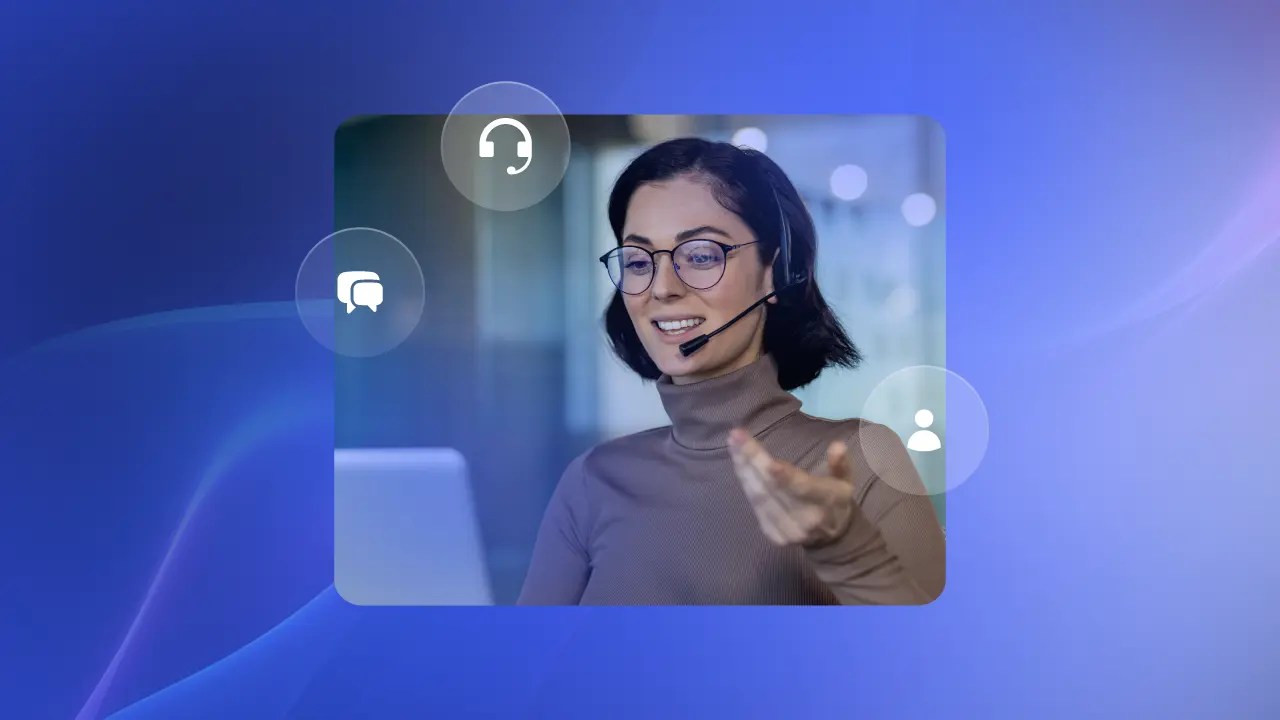Many contact centers handling healthcare-related matters face challenges in ensuring they comply with stringent Health Insurance Portability and Accountability Act (HIPAA) regulations. As the variety of customer communication channels continues to grow, there’s an increasing risk of data breaches and resulting penalties if they fail to comply.
Fortunately, there are contact center tools that have HIPAA-compliant options. Here, we’ll discuss what call center HIPAA compliance looks like, the risks of noncompliance, and HIPAA-compliant features and software.
What HIPAA Compliance Means for Contact Centers
HIPAA mandates the protection and confidentiality of protected health information (PHI) by securing all oral, written, and electronic communications. It ensures that patients can receive confidential and safe access to healthcare without worrying about their private medical information being exposed. It’s a critical component of good patient care.

PHI includes all “individually identifiable health information” held or transmitted. This means that both the medical provider’s organization and your contact center can be liable if HIPAA violations occur.
HIPAA requirements naturally impact medical call centers and answering services handling this information. Any center handling healthcare calls must safeguard PHI, including patient information like names, diagnoses, symptoms, and treatment information.
And with common call center features like automatic call recording and transcripts, SMS text messaging, and online appointment scheduling, compliance can be tricky without the right tools in place.
Risks of Non-Compliance
The U.S. Department of Health and Human Services takes HIPAA violations very seriously. If a healthcare provider is found to breach patient privacy laws, their medical license may be suspended or terminated. Contact centers that fail to secure private patient data face steep consequences.
1. Financial penalties
HIPAA violations can lead to fines ranging from $100 to $50,000 per incident, depending on the severity of the breach.
Providers who unknowingly commit a violation will receive a penalty between $100 and $50,000 per violation, while providers who commit a violation through willful neglect but correct the issue within the required period can be hit with $10,000 to $50,000 per violation.

Source: The HIPAA Journal
2. Potential jail time
Criminal violations of HIPAA occur when covered entities and specified individuals knowingly obtain or disclose PHI. Depending on the severity of the violation, these individuals may face a personal fine of up to $50,000 in addition to imprisonment with one- to five-year maximum jail sentences.
Offenses with the intent to sell, transfer, or use individually identifiable health information for personal gain, commercial advantage, or malicious harm can result in fines of up to $250,000 and a jail sentence of up to 10 years.
3. Legal consequences
Non-compliance can result in federal lawsuits or government audits, leading to significant legal costs. There’s also the risk of civil lawsuits from patients whose data was impacted, which can result in significant financial penalties and legal costs.
4. Reputation damage
Data breaches erode trust, which is critical and difficult to establish today for patients needing healthcare. This directly impacts customer relationships, patient satisfaction, and brand credibility. Your contact center and the medical service providers you work for may struggle to regain that trust.
HIPAA-Compliant Features for Contact Centers
Contact center compliance can and should include HIPAA training for call center agents, policies that consider proactive security measures, and risk assessments for potential vulnerabilities.
You should also ensure you’re choosing contact center software that’s already equipped with HIPAA-compliant features, which can act as a technical safeguard for sensitive information even in a cloud-based environment.
Encrypted communication
Communication and VoIP security should be a topic of concern for medical contact centers, and that means that you need to be using modern data encryption practices on all voice, chat, and email communications. This is essential to secure PHI during transmission and is particularly crucial for cloud-based systems that can be accessed from anywhere.
Call recording encryption
In addition to using encrypted communication practices to protect active communication channels, you also need to ensure that you’re using call recording encryption. Healthcare call center best practices require that all recorded calls must be stored securely with encrypted files to prevent unauthorized access.
Access control
Role-based access control ensures that only authorized personnel can view or handle PHI. You typically won’t need entry-level call center agents to review call histories or transcripts, for example, and there’s no reason for them to be able to review transcripts with PHI.
Audit trails
Your contact center software should track all interactions with PHI, allowing call centers to demonstrate compliance during audits. You should also document any measures you’re taking to protect PHI and patient data to show an effort to maintain compliance.
Business associate agreement (BAA)
Call center providers must sign a BAA with healthcare clients that confirm they comply with HIPAA regulations. Nextiva, for example, requires that our clients sign a comprehensive BAA that addresses the platform’s covered services and states the privacy, security, and breach notification rules required for business associates under HIPAA.
Data backup
While limiting data access is the first priority for HIPAA compliance, it’s still important to ensure that you’re securely and reliably storing that data. Back up all PHI data securely to ensure availability in case of system failures or disasters.
Top 3 HIPAA-Compliant Call Center Software
Not all contact center platforms are HIPAA compliant, but let’s take a look at the three best HIPAA-compliant VoIP platforms and call center solutions.
1. Nextiva

Nextiva provides HIPAA-compliant VoIP and call center solutions with secure communication features and encrypted call recordings.
Key features include:
- A seamless CRM integration
- Encrypted data transmission
- Exceptional and easily customizable access control
- A robust BAA for healthcare clients
Nextiva has a dedicated HIPAA-compliant call center offering that disables contact center features available to other clients, such as emailing voicemail transcripts, playing voicemails through the Nextiva Voice portal, and sending or receiving faxes through email. All enabled features are automatically HIPAA compliant, including call recording and Nextiva analytics.
Why healthcare customers choose Nextiva
Nextiva’s combination of secure communication tools and comprehensive compliance support makes it a top choice for healthcare-focused contact centers.
Case study: How Nextiva Changed the Game for Concordia Care
2. Bright Pattern

Bright Pattern is known for its advanced omnichannel capabilities, and it supports HIPAA compliance with real-time encryption and secure cloud storage.
Key features include:
- Encrypted voice, chat, and video communications
- Omnichannel support for email, text, and social media
- Password protection and separation of functions for access control
- Complete audit records
Why healthcare customers choose Bright Pattern
Bright Pattern stands out with its user-friendly interface and ability to manage communications securely across multiple channels while remaining HIPAA compliant.
3. Global Response

Global Response is a specialized contact center solution with a strong focus on healthcare and HIPAA compliance, offering encrypted interactions and comprehensive data privacy controls. Like Nextiva, they have tailored solutions specifically for healthcare organizations.
Key features include:
- Strong data encryption
- Secure call handling
- Role-based access control
- HIPAA training for agents
- Secure appointment setting
Why healthcare customers choose Global Response
Global Response is designed specifically for healthcare businesses, ensuring compliance with HIPAA while offering personalized customer service solutions.
Best Practices for Achieving HIPAA Compliance in Call Centers
To effectively meet all of HIPAA’s compliance requirements, contact centers should follow these best practices:
Provide employee training
Regular training is critical to ensure that call center agents are aware of HIPAA regulations. Training should include the following:
- How to handle PHI securely
- How to use HIPAA-compliant features of the call center software
- How to implement security best practices like using complex passwords and two-factor authentication to access the contact center solution

Limit data exposure
Not all agents need access to all communication channels or recorded calls. In fact, there are very few reasons why most agents would need access to this information.
Use access control measures to restrict sensitive data only to those who need to access it. Comprehensive and customizable access control features are essential.
Conduct regular audits and monitoring
Conduct internal audits and use system-generated logs to ensure compliance with HIPAA regulations. Not only does this guarantee audit trails are ready to go should anyone come knocking, but it also gives you peace of mind and a layer of legal protection by demonstrating that you’re actively considering compliance as a top priority.
Maintain a BAA
Ensure all software providers and third-party vendors sign a BAA to cover all aspects of compliance. This offers significant legal protection and ensures that all providers are on the same page regarding clear and set expectations.
Use secure communication channels
Ensure that all communication methods — including phone calls, email, and chat — are automatically encrypted. You also want to monitor communication channels for unauthorized access or potential vulnerabilities.

Choose the HIPAA-Compliant Solution Healthcare Customers Love: Nextiva
HIPAA compliance is a non-negotiable factor for healthcare customers, and that includes medical call centers and the healthcare organizations they provide services for.
Many medical call centers and healthcare organizations find Nextiva to be the best and most trusted solution thanks to our HIPAA-compliant solutions and advanced security features.
OTK, for example, used Nextiva to modernize patient care and communication by leveraging automation-rich experiences for agents and customers in a compliant and secure environment.
““The price we get with Nextiva, the flexibility, support… understanding what we could do with the Nextiva system was unbelievable, and at some point, we said, ‘let’s not compare anybody else’” ~Humberto Moya, Director of IT, Concordia Care Inc.
Nextiva offers dedicated solutions for healthcare providers and healthcare contact centers. Get started today.
Improve patient and staff experience.
Small practices to large healthcare organizations trust Nextiva to manage all their end-to-end patient interactions using our HIPAA-compliant platform.

















 Customer Experience
Customer Experience 








